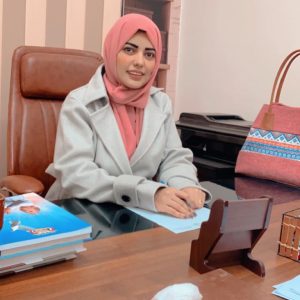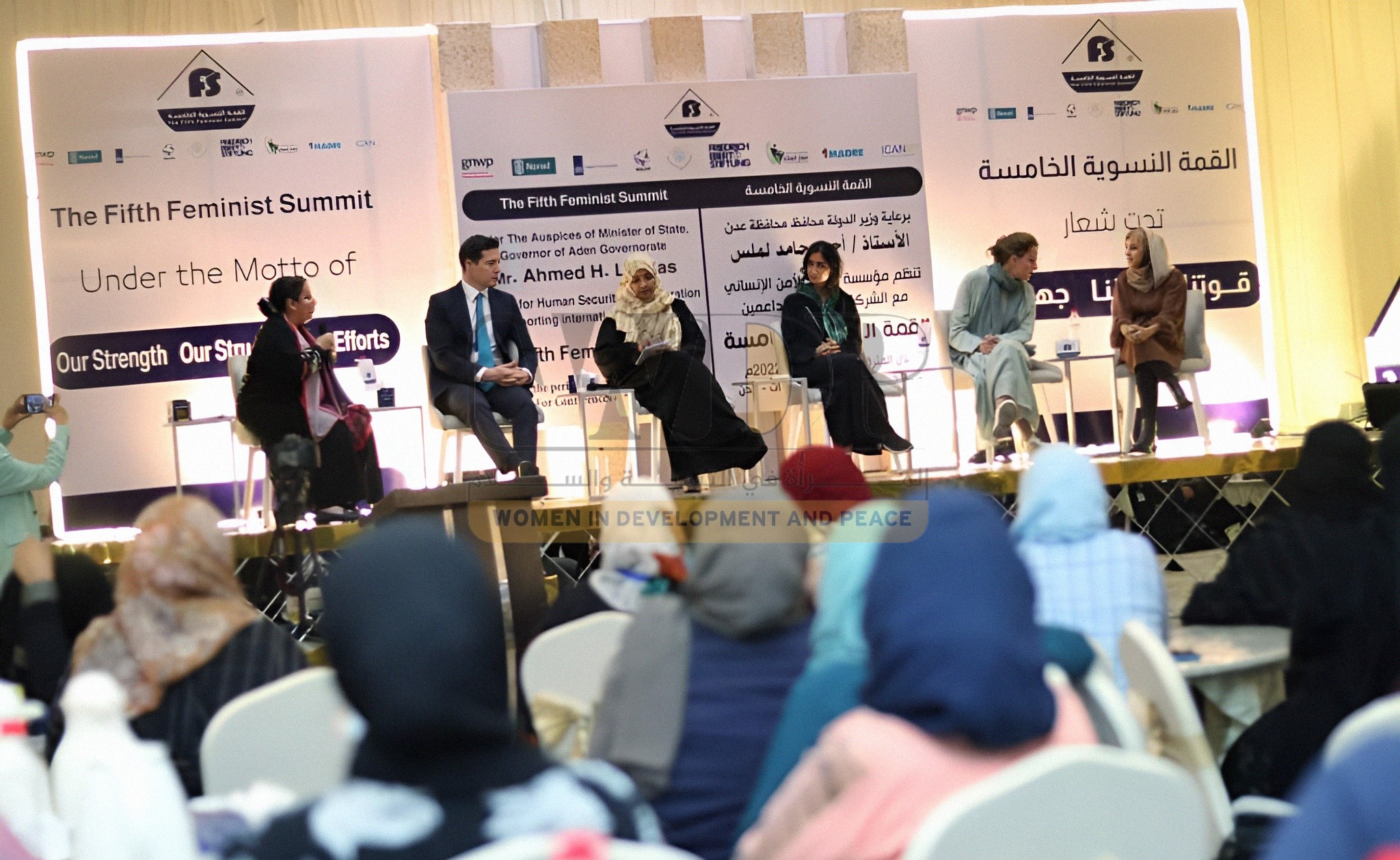Women in Development and Peace – Yasmine Abdulhafeez
Women play an active and important role in diplomatic work, with their capabilities and competence qualifying them to work in this field and accomplish various diplomatic tasks through holding many different positions within the diplomatic corps in Yemen.
The role of Yemeni women in the diplomatic sector has become prominent through the contributions and achievements of some of them. Some have published many works related to the diplomatic field and represented Yemen in many Arab and international forums and festivals. They have presented an honorable model for the country in the embassies in which they worked, and they had a remarkable presence in the delegations that represented Yemen in many Arab and international summits.
Yemeni women have participated in many talks aimed at achieving peace and attended dialogues aimed at reaching consensus among the conflicting parties on all aspects related to the process of stopping the conflict. They have also published many research papers and studies related to the political and diplomatic fields, and women have worked on giving lectures in universities and institutes that teach these specializations at the local and international levels. The diplomatic corps in Yemen has also been filled with female advisors in Yemeni embassies, who have headed Yemeni delegations and participated in Arab and international seminars and meetings. In addition, Yemeni women have worked on establishing women’s groups and consensus in the field of peacebuilding in Yemen and participated in drafting many laws that guarantee the rights of the Yemeni people. They have also been present in many international organizations working in the field of human rights.
The Current Status of Women Diplomats
 In this regard, Mustafa Naji, a researcher and former diplomat, says: “Yemeni women diplomats play an important role in the diplomatic corps alongside men. Women diplomats have also held important positions in various diplomatic functions in the relevant departments.”
In this regard, Mustafa Naji, a researcher and former diplomat, says: “Yemeni women diplomats play an important role in the diplomatic corps alongside men. Women diplomats have also held important positions in various diplomatic functions in the relevant departments.”
Naji adds in his statement to Women in Development and Peace newspaper: “The number of Yemeni women diplomats is small compared to male diplomats, and recent years have witnessed a change in the percentage of women’s participation in the diplomatic corps.” He stressed the importance of women’s involvement in the diplomatic corps and giving them the opportunity for qualitative rehabilitation, especially those with great cognitive and professional competence, which will have an effective impact on the peacebuilding process, but the conflict has ended all these gains.
He continues: “No Yemeni women diplomats have emerged as working ambassadors except for a limited number, including Professor Ramzia Al-Ariani and Professor Nooria Al-Hamami. The latter was a working ambassador at the Yemeni Embassy in Turkey. In addition to ambassadors from outside the diplomatic corps, such as Ms. Amat Al-Aleem Susua.”
He says: “Currently, there are three working Yemeni women diplomats; one of them is from the diplomatic corps, Ambassador Asmahan Al-Tawqi, our ambassador to Italy, and the other two ambassadors are: Ambassador Sahar Ghanim, our ambassador to the Netherlands, and Ambassador Mirfat Mugalli, our ambassador to Poland.”
 For her part, Amani Khalil Bakharaiba, a political researcher, says: “The presence of women in decision-making positions and in the diplomatic corps has remained weak and decorative. In most cases, women are placed in specific leadership positions for many reasons, the most important of which is the dominance of men in leadership positions as a result of the absence of rehabilitation, training, and technical programs that enable women to benefit from reaching advanced positions in decision-making.”
For her part, Amani Khalil Bakharaiba, a political researcher, says: “The presence of women in decision-making positions and in the diplomatic corps has remained weak and decorative. In most cases, women are placed in specific leadership positions for many reasons, the most important of which is the dominance of men in leadership positions as a result of the absence of rehabilitation, training, and technical programs that enable women to benefit from reaching advanced positions in decision-making.”
Researcher Amani Khalil’s statement does not contradict what female activists and politicians have stated, as they stressed the importance of improving the status of women in the field of decision-making and reconsidering their position in all fields to provide better opportunities for them and enabling them to reach positions of influence, as it is a matter that is consistent with achieving development goals.
The Impact of Women Diplomats’ Role
According to researcher Amani Khalil, the presence of many women in diplomatic work has created many available opportunities and contributed to bringing about many real-world impacts, most notably providing an opportunity to improve diplomatic efforts to promote national and global interests, and achieve peace, security, and development. In addition to that, women play an important role in promoting human values in diplomatic work, working to promote justice, equality, and human rights, and forming an essential part of communication and understanding between different cultures and peoples.
She added: “As women represent half of society, the presence of more women in diplomatic work enhances diversity and multiple representation of countries in various sectors and fields. This leads to enhancing participation opportunities, improving diplomatic procedures in general, and improving relations between states and local and international communities.”
She also referred to the effective impact achieved by the participation of Yemeni women in the diplomatic corps, which made their participation in various fields a reality. This was evident through the prominent and active presence of women at the Comprehensive National Dialogue Conference and other local and international conferences.
Researcher Amani explained that during the preparation process for the Comprehensive National Dialogue Conference, republican decrees were issued in 2012 to form the National Dialogue Communication Committee, which consisted of 8 members, including 2 women, representing 25%, and to form a technical committee to undertake the preparation for the National Dialogue Conference, which consisted of 29 members, including 6 women, representing 17%. A woman was also chosen as the official spokesperson for the technical committee.
She continued, “The serious and active participation of women in the technical committee, with international support, resulted in the approval of a quota for women of not less than 30% in the National Dialogue Conference, and obligating all parties to this percentage in their lists of members participating in the dialogue. The final decision was that women’s participation would be 30% of the total number of members, 565, so the percentage of women’s participation in the conference membership reached 29.4%, with 166 female members compared to 399 male members, and women were absent from the presidency of the conference except for one woman as deputy headquarters.”
In her interview with Women in Development and Peace newspaper, she refers to what the participation of women in the Drafting Committee for the New Constitution brought about. Yemeni women obtained a set of political rights and gains, and the Constitution Drafting Committee worked on translating many of the outputs of the National Dialogue Conference into constitutional provisions. Yemeni women had a large share of those provisions, and no chapter or section in the draft constitution was devoid of at least one provision in favor of women. Thus, this draft constituted a revolution in women’s rights. It emphasized gender equality and non-discrimination. The credit for this is significant since it was formulated after completing a national dialogue in which women participated with decisive blocs that made a difference in including the principles of equal citizenship.
After 2019, women’s participation in the political process declined significantly compared to before the conflict. Their participation in official talks was very modest, and the state did not work to empower women in general. Despite the importance of women in diplomatic work, UN reports indicate that women are grossly underrepresented in the diplomatic and foreign services of most governments, especially in high-level positions.
She also explained that it is customary to appoint women to embassies of lesser importance to the country’s foreign relations. In some cases, women face discrimination when appointed due to restrictions related to their family status. Women are often denied opportunities to work in international work due to assumptions about their domestic responsibilities, including the assumption that caring for dependents within the family will prevent them from accepting the appointment.
 For his part, journalist Muhammad Al-Taj says: “Despite the current conflict, Yemeni women have played a major role in the diplomatic field, and women have been found in places where the state is absent. Many Yemeni women have held positions in embassies and diplomatic missions abroad and have worked to strengthen relations between our country and other countries. Yemeni women have also helped in the process of establishing peace, supporting stability and security in the country, and have been able to convey to the world the challenges facing Yemen through their activities abroad. On the local level, they have played an important role in promoting dialogue between the conflicting parties and have worked to present proposals and strategies that enhance the peace process.
For his part, journalist Muhammad Al-Taj says: “Despite the current conflict, Yemeni women have played a major role in the diplomatic field, and women have been found in places where the state is absent. Many Yemeni women have held positions in embassies and diplomatic missions abroad and have worked to strengthen relations between our country and other countries. Yemeni women have also helped in the process of establishing peace, supporting stability and security in the country, and have been able to convey to the world the challenges facing Yemen through their activities abroad. On the local level, they have played an important role in promoting dialogue between the conflicting parties and have worked to present proposals and strategies that enhance the peace process.
He points out in his speech that women working in the diplomatic field face major challenges, including the difficulty of reaching leadership positions. He attributed this to several factors, including the deterioration of the security situation in the country, which makes it difficult for women to work in some areas experiencing conflict due to restrictions on their movement and diplomatic activity.
He added: “Yemeni women need to balance professional and family roles; as women face challenges in managing time and distinguishing between personal and professional life requirements, in addition to the economic challenges facing the country, which affects job and employment opportunities.”
According to Women in Development and Peace newspaper, it may be difficult for Yemeni women to find job opportunities in local diplomacy and to obtain funding to achieve their professional goals, which has greatly restricted Yemeni women. He stressed that the role of Yemeni women in diplomatic work is not commensurate with the status of women and their presence in Yemeni society, as Yemeni women suffer from marginalization in diplomatic work and its various functions, as the diplomatic function has remained a monopoly for men. Al-Taj holds the ongoing conflict in Yemen responsible for preventing Yemeni women from reaching the diplomatic role that befits them.

